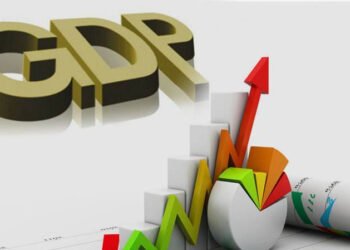A Lecturer at the Department of Economics, University of Ghana, has urged the government to, as a matter of urgency, revise the design of the proposed electronic transactions levy (E-levy) and pass it so as to gain access to the international capital market.
According to Dr. Adu Owusu Sarkodie, passage of the E-levy will signal to international investors that government of Ghana is on the fiscal consolidation path and that it can raise domestic revenue to service its debt.
The Economist stated that the Ghana cedi is currently under stress and one of the short-term solutions is to borrow externally to bring foreign currency into the country. However, he explained that this can only happen after the government demonstrates to the investment community its ability to mobilize domestic revenue to service debt.
“As a matter of urgency, the government must revise the design of the electronic levy (e-levy) and pass it within the shortest possible time to access Eurobonds. According to the international credit rating agencies, the passage of the e-levy and the reversal of the 50% benchmark values at the ports will signal to international investors that government of Ghana is on the fiscal consolidation path and that it can raise domestic revenue to service its debt.
“In the short term, government can also demonstrate its ability to mobilize domestic revenue by paying attention to other sources of revenue such as property tax, tax exemptions, and natural resources”.
Dr. Adu Owusu Sarkodie
Meanwhile, Dr. Adu Owusu Sarkodie stated that the long-term solution to the cedi depreciation is for the country to industrialize, add value to its exports, increase local production and cut down on imports so that there will be enough foreign exchange in the country. He advised that the government’s policy of modernizing agriculture, and the one-district-one-factory should be improved to speed up the process of industrialization.

In the medium-term, the Economist recommended that government should raise more domestic revenue to service its debts, and finance its development without a heavy reliance on borrowing.
High demand for foreign currency
Dr. Adu Owusu Sarkodie explained that Ghana is an import-dependent economy and as a result, continues to buy foreign currency to meet its import demands, with less supply of foreign exchange from its exports.
“Sometimes, the country records a net gain with exports earnings exceeding import costs, but these are paper gains. The actual money is repatriated by the foreign companies that operate in the country. The retention law is not effective to restrain them from repatriating all their profits”.
Dr. Adu Owusu Sarkodie
He further noted that the depreciation of the cedi is seasonal and at its worst between February to March each year. According to him, this is the period during which Ghana-based multinationals repatriate profits. Also, he stated that local businesses import goods on credit ahead of the Christmas season and settle their debts during the first quarter of the year.
“These are the major causes of the cedi depreciation and the fundamentals have not improved significantly over the years”, he emphasized.
The Economist averred that the exchange rate was quite stable, especially during the peak of the COVID-19 period (2020-2021), because imports slowed due to border closures by most countries. However, he indicated that as of 28th February 2022, the Ghanaian cedi was the worst performing currency among 15 top currencies in Africa, depreciating by 7.6% within the first two months of 2022.
Fast rate of Cedi depreciation
Dr. Adu Owusu Sarkodie described the Ghanaian economy as still very much the “Guggisberg economy”, designed to focus on the export of raw materials and importation of finished goods.

Ghana’s reliance on exporting raw materials and importing finished products, according to him, contributed to the country’s persistent demand for, and less supply of foreign currencies. “This is why, for a long time, Ghana’s cedi has been depreciating against the other major trading currencies”, he iterated.
Detailing the causes of the recent poor performance of the cedi, Dr. Adu Owusu Sarkodie underscored that one of the reasons for the recent depreciation is the increased demand for foreign currencies since most businesses in Ghana are now recovering from the COVID-19 shock.
“The second reason is the country’s inability to borrow from the international capital market. Because Ghana isn’t able to generate enough foreign exchange through exports, successive governments have tried to manage the depreciation of the cedi through borrowing from the international capital market, issuing dollar-denominated domestic bonds, and depleting the country’s foreign exchange reserves”.
Dr. Adu Owusu Sarkodie
The Economist emphasized that whenever Ghana’s sovereign bond is no longer profitable and there are not enough reserves to shore up the Cedi, the currency depreciates.
He cited an instance in March 2019 when the US Federal Reserve increased its interest rate which made it more profitable to attract investors. According to him, investors responded by selling sovereign bonds of developing countries like Ghana.
Currently, the world economy is bouncing back after the pandemic, pushing global inflation up. Inflation has moved from 3.1% in 2020 to 3.8% in 2022. The US inflation has risen from 1.35% in December 2021 to 7.46% in February 2022.
The US Federal Reserve has responded by increasing the interest rate, making US sovereign bonds very attractive. Consequently, Dr. Adu Owusu Sarkodie stated that many investors are now selling their bonds in developing countries like Ghana to purchase those of advanced-economies like the US.
Effects of depreciation
Depreciation of any currency makes its imports more expensive and exports cheaper. This is why some countries intentionally devalue their currencies to make their exports cheaper.
However, because Ghana’s export sector is not significantly developed, the country is not able to take advantage of the Cedi’s depreciation by exporting more and earning more foreign exchange. The effect of currency depreciation has been an increase in the cost of imported goods. Most of the imported goods are intermediate goods that are used for local production which leads to rising inflation.
For example, the ex-pump prices of fuel depend a lot on the exchange rate since a greater part of the refined fuel is imported. Currently, there is increasing global demand for crude oil as most industries are now recovering from the effects of COVID. At the same time, the supply of crude oil has slowed down after the Russian invasion of Ukraine. The international crude oil price is expected to continue increasing for some time.
The combined effect of cedi depreciation and increases in international crude oil prices means that the ex-pump price of fuel in Ghana is expected to keep rising, at least until the end of the year 2022.
In response to high inflation, Dr. Adu Owusu Sarkodie projected that the Bank of Ghana will increase its policy rate in an attempt to control the growth of credit. This, according to him, will lead to an increase in the cost of borrowing. Higher borrowing costs will eventually lead to increased costs of production, which will further increase inflation.
READ ALSO: ‘We Resist the Claims of These Adventurers’- Akufo-Addo to Coup Mongers























